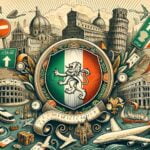Traveling to Italy is a dream for many, with its rich history, stunning landscapes, and delectable cuisine. However, before packing your bags and jetting off to this beautiful country, it is crucial to be aware of the rules and regulations in place for travelers. From COVID-19 restrictions to visa requirements and vaccination mandates, understanding what is expected of you when visiting Italy can make your trip smoother and more enjoyable.
The ongoing COVID-19 pandemic has significantly impacted global travel, and Italy is no exception. Travelers must stay updated on the current regulations imposed by the Italian government to ensure a safe visit. This includes requirements such as testing upon arrival, quarantine protocols, and any specific guidelines for different regions within Italy. It is essential to familiarize yourself with these rules before embarking on your journey to avoid any last-minute surprises or disruptions.
In addition to COVID-19 regulations, travelers should also be informed about visa requirements depending on their nationality when planning a trip to Italy. Understanding the visa application process and ensuring that all necessary documents are in order can prevent any issues at immigration checkpoints. Whether you are traveling for leisure or business purposes, having the proper visa is fundamental to a hassle-free entry into Italy.
COVID-19 Regulations
Italy, known for its rich history, stunning architecture, and delicious cuisine, is a popular destination for travelers from around the world. However, with the ongoing COVID-19 pandemic, it is essential to be aware of the rules and regulations in place for traveling to Italy to ensure a safe and smooth travel experience. So what are the rules to travel to Italy during these challenging times?
- Before traveling to Italy, it is important to check the latest COVID-19 regulations and guidelines set by the Italian government. Travelers may be required to present a negative PCR test result taken within a certain timeframe before arrival or undergo testing upon entry. Additionally, some regions in Italy may have specific restrictions or requirements in place, so it is crucial to stay updated on any changes.
- Upon arrival in Italy, travelers must fill out a self-declaration form stating their reason for entering the country and providing contact information. Failure to comply with these requirements could result in fines or other penalties. It is also recommended to download and use the “Immuni” contact tracing app during your stay in Italy.
- Travelers coming from certain countries or regions may be subject to quarantine upon arrival in Italy. The length of quarantine can vary depending on the traveler’s vaccination status and where they are coming from. It is important to carefully follow all quarantine protocols set by Italian authorities to prevent the spread of COVID-19.
Overall, staying informed about the current COVID-19 regulations and guidelines when traveling to Italy is crucial for a safe and enjoyable trip. By following these rules and regulations diligently, travelers can help protect themselves and others while exploring all that this beautiful country has to offer.
Visa Requirements
When it comes to traveling to Italy, understanding the visa requirements is crucial for a smooth and hassle-free experience. The rules and regulations for obtaining a visa vary depending on the traveler’s nationality, the purpose of their visit, and the duration of their stay. It is essential to research and familiarize yourself with the specific visa requirements that apply to your situation to avoid any issues or complications during your trip.
For citizens of many countries, including those from the United States, Canada, Australia, and most European countries, a tourist visa is not required for stays of up to 90 days within a 180-day period. However, travelers must ensure that their passport is valid for at least three months beyond the intended departure date from the Schengen Area. Additionally, travelers must have proof of sufficient funds to cover their stay in Italy and return transportation tickets.
On the other hand, citizens of certain countries may be required to obtain a visa before traveling to Italy. This includes nationals from countries outside the European Union who plan to visit Italy for purposes such as work, study, or family reunification. In these cases, travelers must apply for a specific type of visa based on their intended activities in Italy and comply with the documentation and application requirements set by the Italian consular authorities.
It is important to note that visa regulations are subject to change, so it is recommended to check the latest updates on the official website of the Italian Ministry of Foreign Affairs or consult with the nearest Italian embassy or consulate in your country. By understanding and following the visa requirements for different nationalities traveling to Italy, you can ensure a stress-free and enjoyable journey in this beautiful Mediterranean country.
Vaccination Requirements
Italy, like many other countries around the world, has implemented various rules and regulations for travelers amidst the ongoing COVID-19 pandemic. Vaccination requirements have become an essential aspect to consider when planning a trip to Italy. The country has been striving to ensure the safety of its residents and visitors by implementing certain guidelines that travelers must adhere to. It is vital for tourists to understand these vaccination requirements before embarking on their journey.
Is Vaccination Mandatory?
As of now, Italy does not have a mandatory vaccination requirement for travelers entering the country. However, it is highly recommended that individuals traveling to Italy be fully vaccinated against COVID-19. Being vaccinated not only protects the individual traveler but also helps in preventing the spread of the virus within Italy. While it is not obligatory, having proof of vaccination can make your entry into the country smoother and more seamless.
How Vaccination Affects Travel
Having proof of vaccination can have several benefits when traveling to Italy. Some establishments may require patrons to show their vaccination status before allowing entry. Additionally, being vaccinated may exempt travelers from certain testing or quarantine requirements imposed by Italian authorities.
It is essential for visitors to stay updated on any changes in regulations regarding vaccinations and how they impact travel plans to Italy. Prioritizing health and safety by getting vaccinated can contribute towards a more enjoyable and worry-free trip to this beautiful Mediterranean destination.
Travel Insurance
Italy is a country that offers a diverse range of attractions, from its rich history and culture to its stunning landscapes and delicious cuisine. When planning a trip to Italy, it is essential to be aware of the rules and regulations in place for travelers. One crucial aspect to consider is having adequate travel insurance.
Travel insurance provides protection against unforeseen circumstances such as trip cancellations, medical emergencies, or lost luggage. It is highly recommended to have travel insurance when visiting Italy to ensure peace of mind during your travels.
Having travel insurance can be particularly beneficial during the ongoing COVID-19 pandemic. Many travel insurance policies now offer coverage for COVID-related issues, such as trip cancellations due to illness or quarantine requirements. In Italy, travelers may encounter specific health and safety protocols that could impact their trip. With the right travel insurance policy, you can protect yourself financially in case you need to change your plans or seek medical assistance while in Italy.
In addition to COVID-19 concerns, travel insurance can also help cover other unexpected events such as flight delays, theft, or medical emergencies. Before purchasing travel insurance for your trip to Italy, make sure to carefully read the policy details and understand what is covered. By investing in comprehensive travel insurance, you can enjoy your time in Italy with greater peace of mind knowing that you are protected against various unforeseen events.
| Travel Insurance Coverage | Benefits |
|---|---|
| Trip Cancellation | Reimbursement for prepaid non-refundable expenses if your trip is canceled. |
| Emergency Medical Expenses | Coverage for medical treatment in case of illness or injury while traveling. |
| Lost Luggage | Compensation for lost, damaged, or stolen baggage during your trip. |
Quarantine Protocols
Italy has implemented strict quarantine protocols for travelers arriving in the country to ensure the safety of its residents and visitors. As part of the rules to travel to Italy, individuals coming from certain countries may be required to self-isolate upon arrival. The duration of the quarantine period can vary depending on the traveler’s vaccination status, recent travel history, and health condition.
Travelers arriving in Italy are advised to stay up to date with the latest COVID-19 regulations and guidelines set forth by the Italian government. It is essential to check if your home country is on Italy’s list of high-risk areas or if you have been in a high-risk area in the past 14 days before your arrival. Failure to comply with the quarantine rules can result in fines or other penalties imposed by local authorities.
To facilitate a smooth entry into Italy without disruptions, travelers are encouraged to plan ahead and understand what are the rules to travel to Italy regarding quarantine protocols. Being informed about these regulations can help prevent any unforeseen issues during your trip and ensure a safe and enjoyable experience in this beautiful Mediterranean country.
| Quarantine Rules | Details |
|---|---|
| Duration | Varies based on vaccination status and recent travel history |
| Compliance | Non-compliance may lead to fines or penalties |
Transportation Rules
Italy is a popular travel destination known for its rich history, stunning architecture, delicious cuisine, and picturesque landscapes. However, before embarking on your Italian adventure, it is crucial to familiarize yourself with the rules and regulations governing public transportation in the country. Understanding these guidelines will not only ensure a smooth and enjoyable trip but also help you avoid any unnecessary stress or complications during your visit.
Using Public Transportation
When traveling around Italy, public transportation options such as trains, buses, trams, and metros are convenient ways to explore the cities and regions. It is essential to purchase tickets before boarding and validate them using the designated machines to avoid fines. Additionally, be mindful of your belongings while on public transport to prevent theft or loss.
Face Mask Requirements
In light of the COVID-19 pandemic, wearing face masks on all forms of public transportation in Italy is mandatory. Make sure to have a suitable face covering with you at all times and follow any additional health protocols set by transport authorities. Failure to comply with these rules can result in penalties or refusal of service.
Accessibility Considerations
If you have mobility issues or require special assistance when using public transportation in Italy, it is advisable to plan ahead and notify the relevant transport operators in advance. Many stations and vehicles are equipped with facilities for individuals with disabilities, but confirming arrangements beforehand can help ensure a seamless travel experience.
By respecting the accessibility rules and guidelines in place, you can navigate Italy’s public transportation system with ease and enjoy all that this beautiful country has to offer.
Health and Safety Guidelines
Italy is a popular tourist destination known for its rich history, culture, and delicious cuisine. However, before embarking on your journey to this beautiful country, it is crucial to be aware of the rules and guidelines in place to ensure a safe and enjoyable travel experience. Here are some health and safety guidelines to keep in mind when traveling to Italy:
- Stay updated on COVID-19 regulations: It is essential to stay informed about the latest COVID-19 restrictions and guidelines in Italy. Travelers should check the official government websites or contact local authorities to understand any specific requirements for entry.
- Practice good hygiene: In light of the ongoing pandemic, it is important to practice good hygiene habits such as regularly washing hands with soap and water, using hand sanitizer, and wearing a mask in crowded places.
- Seek medical assistance if needed: In case of any health concerns or emergencies during your trip, familiarize yourself with the local healthcare system and know how to access medical assistance. It is advisable to carry necessary medications and travel insurance for unexpected situations.
In addition to COVID-19 precautions, travelers should also consider general health and safety tips while exploring Italy. Here are some additional recommendations:
- Be cautious of pickpockets: Like many tourist destinations, Italy has reported incidents of pickpocketing in popular areas. Be mindful of your belongings at all times, especially in crowded places like train stations or tourist attractions.
- Stay hydrated and wear sunscreen: Italy can get quite hot during the summer months, so it’s important to stay hydrated, wear sunscreen, and seek shade when necessary to prevent heat-related illnesses.
- Respect local customs: While exploring Italy’s cities and towns, it’s essential to respect local customs and traditions. Familiarize yourself with cultural norms such as appropriate clothing attire when visiting religious sites or dining etiquette.
By following these health and safety guidelines, travelers can enjoy a memorable trip to Italy while prioritizing their well-being throughout their journey. Remember that preparation is key when traveling abroad, so take the time to research and understand what are the rules to travel to Italy before setting off on your adventure.
Conclusion
Traveling to Italy is an exciting adventure, but it comes with its set of rules and regulations that must be followed to ensure a smooth and safe trip. Understanding the rules to travel to Italy, especially in the current global landscape affected by the COVID-19 pandemic, is crucial for a hassle-free experience.
From COVID-19 regulations to visa requirements, vaccination mandates, travel insurance, quarantine protocols, transportation rules, and health guidelines, being informed about these aspects can make a significant difference in your trip.
One of the essential aspects to consider when planning a trip to Italy is understanding the COVID-19 regulations in place. As the situation evolves, travelers must stay updated on current restrictions and guidelines implemented by Italian authorities.
Additionally, knowing the visa requirements for different nationalities traveling to Italy is vital to avoid any last-minute complications or entry denials. Whether vaccination is mandatory and how it affects travel plans should also be taken into consideration before embarking on your journey.
Furthermore, having travel insurance can provide peace of mind during your visit to Italy by offering coverage for unforeseen circumstances such as medical emergencies or trip cancellations. Familiarizing yourself with quarantine protocols upon arrival and transportation rules within Italy will help you navigate your trip smoothly while adhering to local regulations.
Lastly, following health and safety guidelines recommended for travelers will not only protect yourself but also contribute towards safeguarding others during your time in Italy. Remember that compliance with these rules demonstrates respect for the country’s laws and respects the well-being of its citizens.
Frequently Asked Questions
What Is Required for a US Citizen to Visit Italy?
For a US citizen to visit Italy, there are a few requirements to keep in mind. Firstly, you will need a valid US passport with at least six months of validity remaining beyond your planned departure date from Italy.
Additionally, if you plan to stay in Italy for more than 90 days, you may need to obtain a visa prior to your trip.
Are There Any Restrictions to Travel to Italy?
As of now, there are restrictions for travel to Italy due to the COVID-19 pandemic. Travelers from the United States are currently required to present proof of vaccination, a negative COVID-19 test result, or proof of recovery from COVID-19 before entering Italy. These requirements are subject to change based on the current situation and regulations.
Do I Need Vaccines for Italy?
In general, no specific vaccines are required for travel to Italy from the United States. However, it is always recommended to be up-to-date on routine vaccinations before any international travel. Depending on your individual health situation and any regional outbreaks, consider consulting with a healthcare provider about additional vaccines that may be recommended for your trip to Italy.

I’m a passionate traveler, writer, and Italophile. My fascination with Italy’s history, art, and culture has led me on countless adventures across the Italian landscape. Through “I Live Italy,” I share my love for this extraordinary country and aims to inspire others to explore its boundless beauty.




